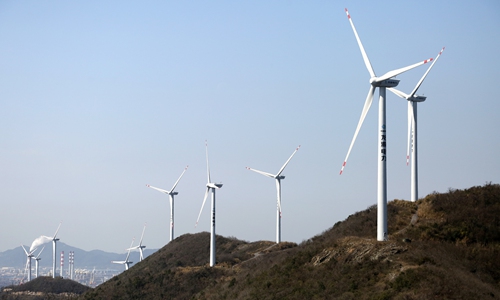Carbon neutrality is daunting job, needs meticulous planning: former central bank chief
Source: Global Times Published: 2020/11/25 16:43:40

On Monday, 17 turbines generate electricity at the Jintangfeng wind farm (????) in Zhoushan, East China's Zhejiang Province. In 2019, total of 44.59 million kilowatt hours of electricity were fed into the grid, eliminating about 44,500 tons of carbon emissions in theory. Photo: cnsphoto
China's mandate to attain carbon neutrality by 2060 is a daunting job, one that will need both meticulous government planning and incorporating market forces to realize, Zhou Xiaochuan, former governor of China's central bank, said.
According to Zhou, China's task to be carbon neutral is especially challenging due to the country's relatively elevated emission volume per unit GDP. China currently emits about 30 percent of the total carbon in the world, but the average emission per unit GDP is even higher.
China is currently the world's largest carbon dioxide emitter, followed by the US and India. Beijing set the goal of reaching carbon neutrality by 2060 in October this year, and pledged to start limiting emissions within the next decade, so that 2030 will be the peak emission year.
Zhou said that to realize the goal, there needs to be some combination and collaboration of both government planning and market mechanisms, such as setting up carbon trading markets, which were already in trial in some parts of China. Carbon taxation is also a potential option. Both can serve as incentives to encourage enterprises to reduce their emissions.
He also noted that linking China's carbon trading market to those in other countries, such as in other parts of Asia and in Europe.
"In terms of financial markets, a carbon trading market has a more important role to play and is likely to be more effective," Zhou said, "If a carbon tax is levied, it must refer to the price formed in the carbon market."
Global Times
Posted in: ECONOMY